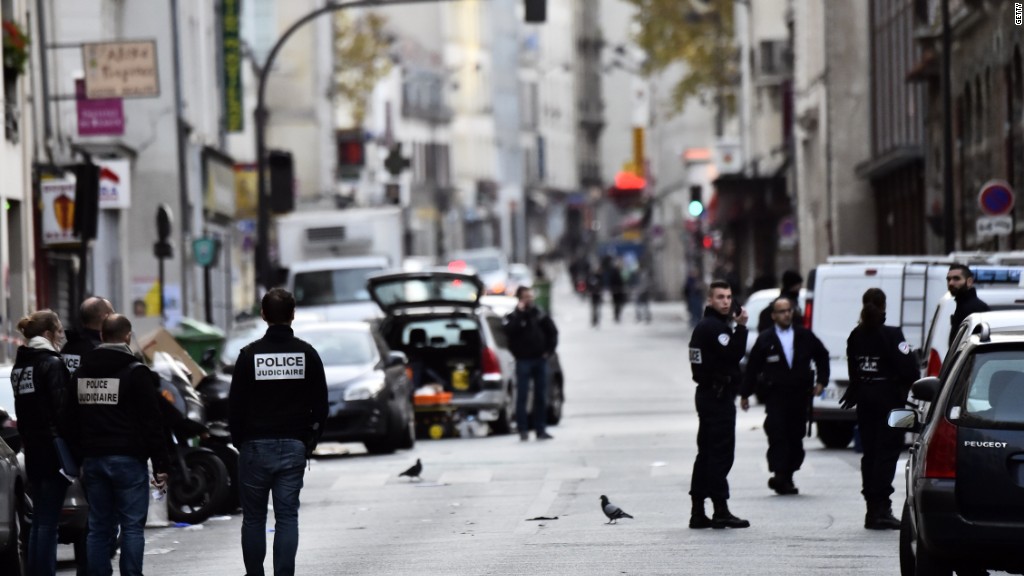
Wall Street is betting the horrific terrorist attacks in Paris will force the United States and its allies to ramp up military spending.
Shares of Lockheed Martin (LMT) and other defense contractors rose sharply on Monday as Western leaders pledged to accelerate efforts to defeat the terrorist group ISIS.
French President Francois Hollande pledged to "eradicate terrorism" in a historic address to a joint session of parliament. "Terrorism will not destroy France, because we will destroy it," Hollande said.
ISIS is the "face of evil" and its leaders "will not have a safe-haven anywhere," U.S. President Barack Obama declared.
The tough talk helped fuel a pop in shares of companies that make the weapons and vehicles used to fight terrorism.
Related: Paris terror attacks: Why stocks aren't freaking
Shares of Raytheon (RTN) bounced 4% on Monday, its second-biggest gain over the past three years. Raytheon makes GPS-guided Tomahawk missiles that have been fired at ISIS from ships more than 1,000 miles away. The company generates more of its revenue from international sales than many of its peers.
Lockheed, which makes the Hellfire missile used to target the ISIS terrorist known as "Jihadi John" last week, also gained 3.5% on Monday.
Shares of Northrop Grumman (NOC) jumped more than 4%. The defense contractor recently won a contract that could be worth $80 billion to build the new stealth bomber. Drone maker AeroVironment (AVAV) soared 6%.
Boeing (BA), the company behind the small diameter bomb used against ISIS, ticked up 1%.
Pentagon spending cuts may be over
Clearly, investors are anticipating the Paris terror attacks and other recent incidents will lead to more lucrative military contracts to fight ISIS.
"You're going to see countries that hadn't seen spikes in spending from the past incidents increase spending," said Frank Cilluffo, director of George Washington University's Center for Cyber and Homeland Security.
That would be a welcome change for defense companies that have been struggling to deal with big spending cuts by the Pentagon in recent years. Efforts to land contracts with foreign governments have been limited by U.S. government bans on exporting sensitive military technology.
Related: Stealth bomber win lifts Northrop to all-time high
The Paris attacks are "likely to bolster political support for defense spending and to eliminate sequestration," Stifel Nicholaus analyst Joseph DeNardi wrote in a research report.
He predicted the issue of military spending will get further attention from the presidential candidates in both parties who are vying to replace Obama in the White House. DeNardi also noted that neither Republicans nor Democrats had been calling for cuts to defense budgets.
"It makes clear to us that 2015 is the bottom of this cycle for defense industry revenue," DeNardi wrote.
Related: French tourism set for short-term pain after Paris attacks
No ground troops
However, it remains to be seen how much of a bump up in revenue this will mean.
Obama on Monday reiterated his opposition to deploying large levels of U.S. troops in the Middle East.
"It is not just my view but the view of my closest military and civilian advisers that that would be a mistake," Obama said.
DeNardi doesn't believe the Paris attacks have created a "tipping point" that would lead to more troops on the ground. That's critical to defense stocks because he said troop deployments, not political sentiment, tends to be the main driver for U.S. military budget cycles.
CNNMoney's Patrick Gillespie contributed to this report.


